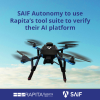- Barcelona Supercomputing Center – Centro Nacional de Supercomputacion (Spain) will be implementing time randomization solutions at processor and compiler level.
- Rapita Systems Ltd (UK) will extend their RapiTime WCET analysis tool to encompass the new probabilistic analysis techniques.
- Sysgo S.A.S. (France) will upgrade their PikeOS RTOS to support the probabilistic approach.
- Universita di Padova (Italy) will design the software infrastructure underneath the application and develop timing analysis techniques for multicore and manycore processors.
- Institut National de Recherche en Informatique et en Automatique (INRIA, France) will propose probabilistic and statistical timing analyses and develop the associated prototype tools.
- Aeroflex Gaisler (Sweden) will develop system on chip (SoC) designs that include probabilistic extensions.
- Airbus Operations SAS (France) will provide an avionics case study and will investigate the readiness for certification of the PROXIMA solutions.
- University of York (UK) will research and develop probabilistic and deterministic techniques and prototype tools for the analysis of Worst-Case Execution Times (WCET) and end-to-end timing behaviour.
- Airbus Defence and Space (France) will design case studies that are representative of current space activities.
- Ikerlan S.COOP (Spain) will provide a case study representative of the rail industry.
- Infineon Technologies UK Ltd will validate the PROXIMA requirements against automotive needs, and will also provide an automotive case study.
- The PROXIMA project is scheduled to take three years to complete and has a budget of €6,793,991. The EC contribution to this project is €4.65M. The contract number is 611085.
Back to Top
Over the next decade, the embedded software industry will face a massive transition to multicore and manycore processors. This architectural revolution intensifies an already existing severe challenge to the development of Critical Real-Time Embedded Systems (CRTES), namely the need to show that software timing behaviour is always correct during operation. Previous research carried out in the EU-funded PROARTIS project has demonstrated how this threat can be mitigated through the application of randomization. PROXIMA (Probabilistic real-time control of mixed-criticality multicore and manycore systems), a 36-month project funded under the EU FP7 research programme, builds on the results of PROARTIS, and will result in a comprehensive suite of hardware and software platforms and probabilistic analysis methods integrated into commercial design, development and verification tools.
Current CRTES, based on relatively simple single core processors, are already extremely difficult to analyse for correct timing behaviour. The advent of multicore and manycore platforms exacerbates this problem, rendering existing software performance and worst case execution time (WCET) analysis techniques ineffectual. A new approach is needed.
PROXIMA aims to provide this new approach. The PROXIMA project asserts that the timing behaviour of mixed-criticality CRTES executing on multicore and manycore platforms can be analysed effectively via probabilistic techniques. Outcomes of the PROXIMA project include: bringing the probabilistic approach to a state of technological readiness, building on key contributions by each of the partners, and making the probabilistic techniques applicable to the industry sectors of Aerospace, Automotive, Rail and Space.
Project coordinator, Francisco Cazorla commented "The PROARTIS project has reached its goals in defining the theoretical foundations and providing initial evidence of how probabilistic analysis techniques can be applied to analyse the timing behaviour of complex hardware and software when their timing behaviour is randomised. In PROXIMA our focus will be on industrialising some of the technologies developed in PROARTIS for mixed-criticality multicore systems and extending the theoretical foundations to cover manycore systems. This two-fold approach ensures high impact in the real-time industry in both the short term and the long term".
The partners participating in the PROXIMA project are:

 Rapita System Announces New Distribution Partnership with COONTEC
Rapita System Announces New Distribution Partnership with COONTEC
 Rapita partners with Asterios Technologies to deliver solutions in multicore certification
Rapita partners with Asterios Technologies to deliver solutions in multicore certification
 SAIF Autonomy to use RVS to verify their groundbreaking AI platform
SAIF Autonomy to use RVS to verify their groundbreaking AI platform
 RVS gets a new timing analysis engine
RVS gets a new timing analysis engine
 How to measure stack usage through stack painting with RapiTest
How to measure stack usage through stack painting with RapiTest
 What does AMACC Rev B mean for multicore certification?
What does AMACC Rev B mean for multicore certification?
 How emulation can reduce avionics verification costs: Sim68020
How emulation can reduce avionics verification costs: Sim68020
 How to achieve multicore DO-178C certification with Rapita Systems
How to achieve multicore DO-178C certification with Rapita Systems
 How to achieve DO-178C certification with Rapita Systems
How to achieve DO-178C certification with Rapita Systems
 Certifying Unmanned Aircraft Systems
Certifying Unmanned Aircraft Systems
 DO-278A Guidance: Introduction to RTCA DO-278 approval
DO-278A Guidance: Introduction to RTCA DO-278 approval
 Avionics Certification Q&A: CERT TALK (with Consunova and Visure)
Avionics Certification Q&A: CERT TALK (with Consunova and Visure)
 NXP's MultiCore for Avionics (MCFA) Conference
NXP's MultiCore for Avionics (MCFA) Conference
 DO-178C Multicore In-person Training (Heathrow)
DO-178C Multicore In-person Training (Heathrow)
 Avionics and Testing Innovations
Avionics and Testing Innovations










